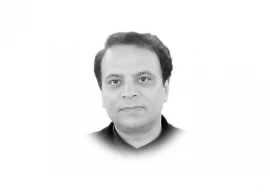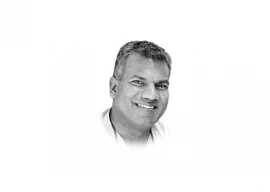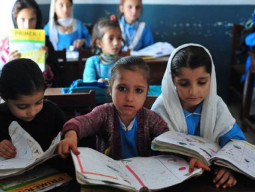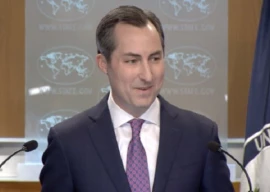
However, this resilience, though admirable, only illustrates a spiral of uncontrollable violence and the inevitable deterioration of a collective mindset, for sooner than later, the cracks will begin to show, the courage will diminish and hopelessness will prevail. Governed by a flawed system that fails to acknowledge accountability and in most cases, remains detached from its people, the citizens of Karachi will have to take ownership of their future; and they will have to do this fast because with the test of time, resilience wears out and apathy settles in.
Innumerable bomb blasts on military bases and commercial property, the irreparable loss of innocent lives, the increase in targeted killings, the heightened security of the elite, the rise in kidnappings and the general paranoia and fear that grips even the more affluent parts of the city, is palpable and worrying. Particularly troublesome is the acknowledgment that reliance on the government is futile, which begs the obvious question: what are the citizens of Karachi to do when they cannot even seek security or assistance from those whom they have elected to uphold the rule of law and safeguard the basic rights of the people. Utopia is certainly a funny thing but working within a system, regardless of how dysfunctional it may be, is the only option. To gradually introduce a more transparent and reliable system of governance, it is imperative to understand and address the flaws that already exist. And for that, patience and perseverance is critical.
‘Karachiites’ are quick to protest on the streets at even the slightest hint of an infringement upon their political rights as was evident from the protests at Teen Talwar following the May 11 elections. The denial of security is a much greater threat to survival. Urgent and collective measures, exercised by concerned citizens and the private sector, are required to sustain pressure on the new government to save the deteriorating heart of an already crumbling economy. The current state of the economy is certainly complicated but now is the time to ascertain what can be salvaged and in doing so, promptly introduce new measures to yield workable, if not positive, results. While the prime minster has ‘taken note’ of the escalating violence in Karachi and recognises the correlation between ending terrorism and boosting the economy, words are of little consequence if not followed up by actions. According to the All-Pakistan Business Forum, Karachi, the country’s financial and industrial capital, can potentially attract close to $15-20 billion if the law and order situation were improved.
In many ways, Karachi will continue to burn if its economy is shunned and its citizenry is unable to inflict sustained pressure on the government to introduce stringent security measures. Every violent incident that takes place in Pakistan’s beating heart of 20 million people, who strive to recover every day, is not just an illustration of Karachi’s resilience but also a painful reminder of just how much it has deteriorated.
Published in The Express Tribune, August 22nd, 2013.
Like Opinion & Editorial on Facebook, follow @ETOpEd on Twitter to receive all updates on all our daily pieces.
COMMENTS (11)
Comments are moderated and generally will be posted if they are on-topic and not abusive.
For more information, please see our Comments FAQ
1734680432-0/Untitled-(75)1734680432-0-405x300.webp)

1729161093-0/liam-(4)1729161093-0-165x106.webp)








1734511806-0/Untitled-design-(5)1734511806-0-270x192.webp)
1734587529-0/Express-Tribune-(1)1734587529-0-270x192.webp)


1734606611-0/Express-Tribune-(8)1734606611-0-270x192.webp)
1734468458-0/Copy-of-Untitled-(50)1734468458-0-270x192.webp)


@Big Man: In order to be resilient, you have to become numb and heartless. Not the fault of the denizens of the city, rather the circumstances they find themselves in.
Karachi was a very peaceful place until much after the independence. I grew up with Karachi. There was nothing beyond Napier Barracks. Fiftees was perhaps the worse economic period, yet it was peaceful and people from all over Pakistan and migrants lived with together with no no problems and shared whatever they had. Government did whatever it could with the resources available with it. It was the people who look after one another. What is the reason for politics of HATE now. Karachi even today still is the best place, education wise, economically, socially. It is cosmopolitian city We should spread the word of love and tolerance and love. The problem is that from the childhood, it is our elders who give us directions as to how we should lead our life, be it education, marriage career. So we look upto the government for everything. We vote the government in power and then we expect them to show us how to lead our life. How can the government stop from HATING one another. I remember the Karachi of 50s, we stayed out late, at times upto 2am, there were no problems. Nursary was hub of business and social activities, followed by Tariq Road and it has expanded, east, west, north and south. It is not the government, it is the younger generation who has to do something. In are youth, we had no Hate and violence
My memories are so fresh I can remember my childhood growing up in Karachi the 1960s. Karachi had been known for its beautiful clean beaches, well-kept buildings with Victorian Gothic architecture, bazaars filled with gold and silver jewelry, exotic spices, silk saris, camel carts, and snake charmers. I remember hours spent in cinema halls like Nishat, Naz, Plaza, Lyric, Bambino, Paradise, Capitol, Rex and Palace. . But over time Karachi became a city of kababs and parathas, sprawling shanty towns, gaudily decorated trucks and buses, curbside dentists and fortune tellers, and millions and millions of filthy paan eating/paan spitting people. . What is Karachi is now ? A city that is forced to accommodate diverse ethnic groups who lack any civics or manners. A city when you step out with fear of being robbed. City officials corrupt to the core. Politicians with fake degrees. Wahabis growing by the day. The best days of Karachi are long gone.
@Big man, well said, sadly. @Umar, yes reporting on neighbours so that people abuse this for their personal gains and bribe the police to arrest those agaisnt whom they have personal vendettas.
@Big Man: Do not come to Karachi. Leave it alone.
Karachi needs to be divided into 6-7 zones with their own local governments. This is not the ultimate solution but would constitute a good start to bring ownership and sense of belonging and control closer to the zones' residents. No other high falutin solutions will work till this is done.
The scale the killing is going on, is nothing but war. Pakistan, particularly Karachi has been invaded by secret NATO operatives. This war started the day Afghanistan was invaded and the purpose is to break the will of the people of Karachi/
Potential is everywhere, but it means nothing unless things are done for constructive change and unfortunately I do not see that at all.
Karachi is not resilient, its heartless.
First solution for improving security is to divide police into different divisions such as street crime fighting force, homicide division, anti-terrorist forces and homicide division to solve crimes related to domestic issues. Secondly, Neighborhood watch programs should be started. People should be encouraged to report their neighbors who display pro-terrorist or pro Taliban tendencies. Thirdly, all exit and entry points should be monitored strictly. People coming from the Tribal areas should be thoroughly checked and IDPs should be given space only in the camps. These steps can solve the security related issues to a certain extent.
TRUE, yet troubling words. The permeating violence kills this city everyday yet the people remain resilient. But even resilience has its breaking point. Honest opinion. Government needs to wake up, no matter how brave its people claim to be. The citizens should never have to show how resilient they are if they are governed by an accountable, transparent and committed government.